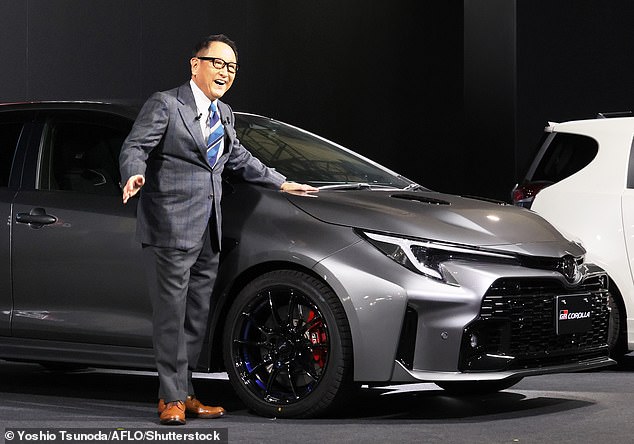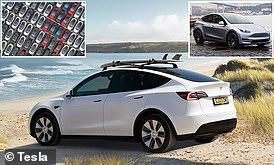Electric cars will never dominate the automobile market, according to the world’s second biggest car manufacturer Toyota.
The chairman of the Japanese carmaker said that battery-powered vehicles will only ever capture 30 per cent of the global market.
His comments raise concerns about consumers’ willingness to align with net zero goals that have been set to tackle the climate crisis.
However, his statement comes in the wake of Tesla’s Model Y being confirmed as Europe’s best-selling new car in 2023.

Electric cars will never dominate the automobile market, according to the chairman of the world’s biggest car manufacturer Toyota
Akio Toyoda said traditional combustion engine cars, hybrids and hydrogen fuel cell vehicles would make up the rest of the market.
The chairman – whose grandfather founded Toyota in Japan in 1937 – said that the shift to electric vehicles (EVs) was not the answer when a billion people worldwide still live without electricity, and therefore wouldn’t be able to charge an EV.
‘We also supply vehicles to these regions, so a single BEV [battery electric vehicle] option cannot provide transportation for everyone,’ he said in remarks published on the Toyota website.
‘That’s why I try to have a variety of options. No matter how much progress BEVs make, I think they will still only have a 30 per cent market share.’
He said the remaining 70 per cent of vehicles would include other types of greener vehicles, but added: ‘Engine cars will definitely remain. I think this is something that customers and the market will decide, not regulatory values or political power.’
Pushing back against the focus on battery EVs at the expense of alternatives, Toyoda said: ‘The enemy is CO2. So, let’s all think about reducing CO2.’
Governments around the world are pressing drivers to ditch petrol and diesel cars in favour of electric alternatives in a bid to hit climate targets.
In 2024, the revenue in the Electric Vehicles market is projected to reach a staggering $623.3billion worldwide, with 3.7million EVs sold globally in the third quarter of 2023 alone – making up 18 per cent of the world’s passenger vehicle sales.
In fact, electric car markets have seen exponential growth, with the share of EV sales more than tippling in three years – from 4 per cent in 2020 to 14 per cent in 2022, to the 18 per cent in 2023, according to the International Energy Agency.
Car brands such as EV carmaker Tesla have boomed in popularity.
Sales figures show the US brand’s Model Y is the best-selling new car of last year, such is the demand for the electric SUV.
With 254,822 registrations, it was 20,000 units ahead of the second most popular new car on the continent, the budget-friendly Dacia Sandero.
In contrast, some brands – including Toyota – have been slow to expand their portfolio of EVs, with the Japanese maker instead continuing to focus on hybrid powertrains.

The chairman of Toyota said that battery-powered vehicles will only ever capture 30 percent of the global market, raising concerns about consumers’ willingness to align with net zero goals that have been set to tackle the climate crisis

Akio Toyoda said traditional combustion engine cars, hybrids and hydrogen fuel cell vehicles would make up the rest of the market
Meanwhile, half of the world’s electric cars are now in China.
But there has been reluctance among some drivers amid fears over the cost of electric cars and a lack of infrastructure available, such as charging points.
The time it takes to charge an EV (compared to fill up a tank) and an electric vehicle’s viability over long distances, has also resulted in some reluctance.
Last year, Rishi Sunak delayed the ban on the sale of new petrol and diesel cars in Britain from 2030 to 2035 following a campaign by the Daily Mail.
A report published this week by Aston University warned that the UK faces falling behind other markets when it comes to the manufacturing of EVs due to our heavy reliance on battery imports.
The nation’s automotive industry is at a critical point where it needs to ‘adapt, innovate and invest’ in order to ‘seize the opportunities the electric vehicle market brings to the UK,’ according to the university’s Centre for Business Prosperity.
The need for immediate policy intervention and reduced reliance on battery importing is fundamental, the study concluded.
Some links in this article may be affiliate links. If you click on them we may earn a small commission. That helps us fund This Is Money, and keep it free to use. We do not write articles to promote products. We do not allow any commercial relationship to affect our editorial independence.





